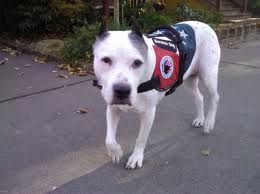Service dogs are such a huge part of many families. It’s so great to see a month being dedicated in their honor! 
A Service dog (also known as an assistance dog, guide dog, signal dog, emotional support dog or therapy dog) is specially trained to help those that are disabled or need assistance.
Einhorn Insurance has the pleasure of insuring many service dogs for our clients that are autistic, blind, depressed/anxious, suffering from Lyme’s Disease, have allergies, prone to seizures, in wheelchairs or that are returning veterans with Post Traumatic Stress Disorder. For these individuals, their service dog is their lifeline.
Service Dogs and Emotional Support Dogs are therapeutic and specifically trained to directly help their owner. Because they provide a particular service, Service and Emotional Support Dogs have the legal right to go everywhere and live in housing even when pets ARE NOT allowed or specific breeds are not allowed.
According to the Fair Housing Amendments Act of 1988, Section 504 of the Rehabilitation Act of 1973, and Title II of the Americans with Disabilities Act protect the right of people with disabilities to keep emotional support animals, even when a landlord’s policy explicitly prohibits pets. Because emotional support and service animals are not “pets,” but rather are considered to be more like assistive aids such as wheelchairs, the law will generally require the landlord to make an exception to its “no pet” policy so that a tenant with a disability can fully use and enjoy his or her dwelling. In most housing complexes, so long as the tenant has a letter or prescription from an appropriate professional, such as a therapist or physician, and meets the definition of a person with a disability, he or she is entitled to a reasonable accommodation that would allow an emotional support animal in the apartment.*
*Information found on http://www.servicedogtags.com/emotional_support_animals.htm
Did you know that a landlord isn’t allowed to ask why you need a service dog? If asked, you DO NOT need to tell your landlord about your emotional or physical disability. The American Disabilities act is designed to protect those with all types of disabilities.
Do you qualify to have a Service Dog?
If you have a condition or disability that makes it hard for you to perform (or limits your ability) to function in life’s daily activities (while other people don’t have difficulty), you may qualify.
YOU DO NOT NEED A DOCTOR’S NOTE, EXCUSE OR FORMAL DIAGNOSIS to have a Service Dog and you may be able to train your pooch yourself!
Below are physical and Emotional/Mental Problems that may entitle you to a Service Dog.
| Physical Problem Asthma (or other breathing problems) Blindness (& partial blindness) Deafness (& partial deafness) Diabetes Dizziness/Balance problems Epilepsy General Hearing Difficulty Mobility Problems Neurological Problems Paralysis Physical Weakness Speech Problems Seizures | Emotional/Mental Problem Age-Related Cognitive Decline Any Psychiatric Condition (check website for exclusion) Autism Depression Dyslexia Bipolar Disorder Emotionally Overwhelmed Panic Attacks Post-Traumatic Stress Disorder (PTSD) Separation Anxiety Social Phobia Stress Problems |
**List found on http://www.nsarco.com/listofdisabilities.html
For more information on making your dog a Service or Emotional Support Dog visit NSAR, National Service Animal Registry http://www.nsarco.com/index.html .
Einhorn Insurance hopes you found this information helpful and please remember, violators of the ADA can be required to pay money damages and face penalties.
 










I am looking for a company to offer a quote for my 18month old Service Dog who is trained as a Mobility Service Dog. I’m finding it very difficult to find anyone who offers LIFE INSURANCE on my SD in the event of an untimely death. It would be an out of pocket expense of nearly $8,500 to find/purchase a replacement. Can you offer any help? Thank You
Hi Joseph,
Thank you for the message. We’ll be contacting you this weekend.